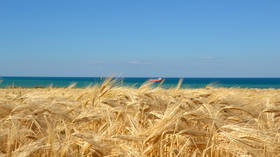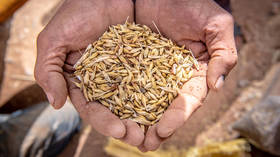Turkey to help unblock Ukraine grain – media

Ukrainian wheat may soon be headed to world markets once again, under a proposal that would involve Turkish ships demining the waters around Odessa and sharing escort duties with the Russian Navy, multiple outlets reported on Monday. The “grain corridor” could help with food shortages in a number of countries in Africa and the Middle East, including Turkey itself.
According to Bloomberg, quoting Ukrainian President Volodymyr Zelensky, Kiev is negotiating with the UN on how to export the grain, and is skeptical of a “tentative” deal between Russia and Turkey.
UN Under-Secretary-General for Humanitarian Affairs Martin Griffiths arrived in Moscow on June 3, for talks about restoring the shipments of grain from the Black Sea ports, according to Reuters.
The Russian outlet Izvestiya, however, quoted a “high-ranking informed source” to offer some details of the proposed scheme. It would see the Turkish navy clearing a corridor through Ukrainian sea mines from the Black Sea port of Odessa and escort the cargo ships to international waters. At this point, Russian Navy vessels would take over and escort the freighters to the Bosporus.
Izvestiya’s source confirmed the participation of a high-ranking UN official and added that the “grain corridor” roadmap should be formalized later this week, when Russian foreign and defense ministers visit Turkey.
The proposed arrangement applies only to Odessa at this point and the exact route of the grain ships also remains to be mapped out, the source added.
Ukraine normally accounts for around 9% of the world’s grain exports. Russia claims that Kiev’s military mined the approaches to Odessa and other Black Sea ports in February. Some 22.5 million tons ended up stuck on cargo vessels unable to depart.
“It wasn’t us who mined the approaches to the ports. Ukraine did,” Russian President Vladimir Putin told the TV channel Rossiya 24 on Friday, promising that Moscow would guarantee peaceful passage of the grain ships if Kiev cleared the mines and allowed them to leave. He also offered other routes to export the grain, whether through the Russian-controlled ports of Berdyansk and Mariupol, via the Danube, or overland through Belarus and Poland.
“So far the Ukrainian grain has been exported using trains and trucks through EU member states and Moldova, but we haven’t seen any of it reach the market,” said Izvestiya’s source. “That makes us wonder if the EU is taking the Ukrainian grain as payment for weapons deliveries.”
Zelensky has blamed the “Russian naval blockade” of the Ukrainian coast for the cargo ships’ predicament, saying that Moscow “deliberately created the problem to make things difficult for Europe” and deny Ukraine millions of dollars in revenue it needs.
Russia attacked the neighboring state in late February, following Ukraine’s failure to implement the terms of the Minsk agreements, first signed in 2014, and Moscow’s eventual recognition of the Donbass republics of Donetsk and Lugansk. The German- and French-brokered Minsk Protocol was designed to give the breakaway regions special status within the Ukrainian state.
The Kremlin has since demanded that Ukraine officially declare itself a neutral country that will never join the US-led NATO military bloc. Kiev insists the Russian offensive was completely unprovoked and has denied claims it was planning to retake the two republics by force.














